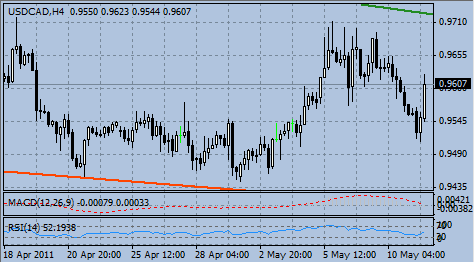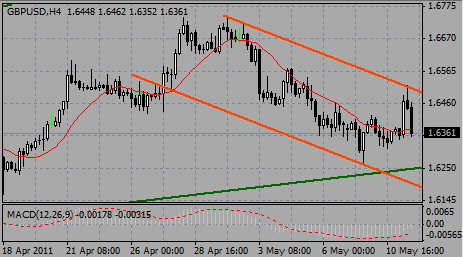- Analytics
- News and Tools
- Market News
- US focus: Canadian dollar declines as crude oil drops
US focus: Canadian dollar declines as crude oil drops
Canada’s dollar dropped for the first time in four days against the greenback as crude oil fell after a report showed U.S. inventories rose to a two-year high and North American stocks declined.
The Canadian dollar weakened a day after Finance Minister Jim Flaherty said the government wants to avoid extreme currency fluctuations.
Crude oil for June delivery fell 4.8% to $98.90 a barrel.
Supplies of crude in the U.S., Canada’s biggest trading partner, jumped 3.78 million barrels to 370.3 million in the week ended May 6, the Energy Department said today in a weekly report. Inventories were forecast to climb by 1.5 million barrels. The increase puts supplies at the highest level since May 8, 2009.
Canadian employers added a net 58,300 jobs in April after a decrease of 1,500 in the previous month, Statistics Canada reported last week. The median forecast of economists was for an increase of 20,000. The jobless rate unexpectedly dropped to 7.6%.
The nation reported a fourth straight trade surplus in March, the longest string since November 2008 and a sign that exporters are recovering from the global recession.
The surplus widened to C$627 million ($658 million), larger than the C$400 million median forecast.
The pound gained versus the dollar and the euro after the Bank of England said it sees inflation “markedly higher” in the near term, boosting speculation that borrowing costs will rise from record low levels.
The Bank of England left its main interest rate at a record-low 0.5 percent on May 5, three days after King indicated he favors keeping borrowing costs on hold, even as inflation accelerates at twice the bank’s 2% limit.
© 2000-2026. All rights reserved.
This site is managed by Teletrade D.J. LLC 2351 LLC 2022 (Euro House, Richmond Hill Road, Kingstown, VC0100, St. Vincent and the Grenadines).
The information on this website is for informational purposes only and does not constitute any investment advice.
The company does not serve or provide services to customers who are residents of the US, Canada, Iran, The Democratic People's Republic of Korea, Yemen and FATF blacklisted countries.
Making transactions on financial markets with marginal financial instruments opens up wide possibilities and allows investors who are willing to take risks to earn high profits, carrying a potentially high risk of losses at the same time. Therefore you should responsibly approach the issue of choosing the appropriate investment strategy, taking the available resources into account, before starting trading.
Use of the information: full or partial use of materials from this website must always be referenced to TeleTrade as the source of information. Use of the materials on the Internet must be accompanied by a hyperlink to teletrade.org. Automatic import of materials and information from this website is prohibited.
Please contact our PR department if you have any questions or need assistance at pr@teletrade.global.

















